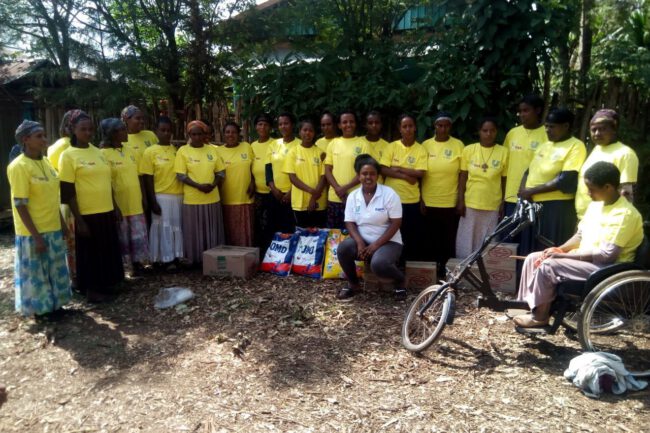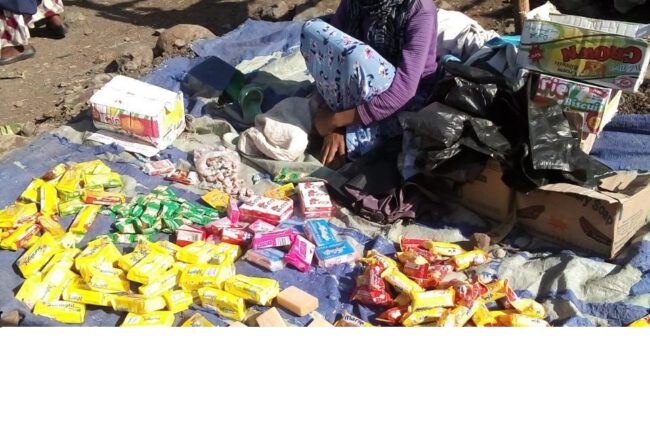Unilever aims to boost women’s entrepreneurship at the last mile. Digital Shakti builds on Unilever Ethiopia’s Shakti program to improve income opportunities for 8,000+ young women in urban and peri-urban areas. Shakti is an inclusive distribution model that provides a source of income to 3,600 women entrepreneurs while extending Unilever’s reach of essential products to over 2.4 million people at the ‘last mile’.
The Problem
In Ethiopia, women are more likely than men to be unemployed – nearly 50% are unemployed, and rates are higher among young women in peri-urban and urban areas. In addition, women face gender-specific barriers to employment, such as the “second shift” of household tasks and a lack of support from male family members. In Ethiopia, women who have jobs outside of their home are 13% more likely to experience physical abuse, 34% more likely to experience emotional abuse, and the violence incidents experienced per month increases by 32%. These barriers result in a nearly USD 800 difference in GNI per capita between men and women. [UNDP: NHDR Ethiopia 2018]
Youth unemployment, estimated anywhere from 25-50%, is compounded by a lack of demand-driven digital and financial literacy and skills. For young women with entrepreneurial ambitions, many lack a supportive network to grow and succeed. Disruptions to the informal sector since the onset of COVID-19 have limited opportunities even further.
The Solution
The Digital Shakti program will aim to empower young women by developing transferable digital, financial, and soft skills matched to the services common to market-driven, dynamic retailers and shopkeepers. Our program has five key activities to successfully attract, hire, and retain young women:
1. Youth & Gender Recruitment strategy
In the current market, female entrepreneurs can be prevented from applying for jobs for practical reasons (e.g. women disproportionally carry the unpaid care burden) and social reasons (e.g. social stigma, socially desirable sectors, confidence issues). Compared to young men, young women also tend to stay at home and not go out seeking information and employment opportunities (information asymmetry). For the Youth & Women Recruitment Strategy, we will organize on- and offline recruitment events and outreach activities specifically targeting youth and women. To inspire, we will ask current female sales agents to share their experiences as a form of female mentorship and role-models. Unilever acknowledges that youth have a mix of identities (e.g. religion, race, culture, socio-economic status, family) and adheres to diversity principles in the Youth & Women Recruitment Strategy.
2. Youth career progression strategy.
Youth face specific barriers of progressing in their careers, having little work experience, few job opportunities, and few role models in order to be more motivated and resilient. The career progression strategy of Unilever will strive to offer Shakti agents a clear path to higher income generating opportunities, such as opening additional stores or progressing to fixed employment by becoming an RSP and later an ROM. There will be a ‘Personal Development Plan’ in place between the agent and her RSP, along with a mentorship program with more experienced agents.
3. Peer-to-peer learning and coaching
Young RSPs and Shakti agents face barriers to give their opinion about company management strategy or to advocate about their working conditions. Peer-to-Peer Engagement will be facilitated via WhatsApp or Facebook groups to increase employee’s learning, retention, motivation and connection to the company’s vision. The development of these groups will be further detailed and structured under this program by Bopinc, with the support and technical assistance of CFYE.
4. Work-life Balance Measures
From agent to management level, especially for young mothers, the key barrier is combining personal with professional life. Unilever will put in place Work Life Balance Measures for young mothers who are sales agents, as well as RSPs and ROMs. For sales agents, it is possible to have flexible working hours and work from home. Additional measures by Unilever and sales agents, as well as its employees, could involve optional childcare, parental leave and maternity cover, following the gender needs assessment studies at project inception and CFYE’s recommendations.
5. Household-Dynamics Training
In the household, male relatives might prevent women from employment and ownership of digital devices such as a smartphone or generate gender-based conflict. This is a particular concern if women start to earn more than their male relatives. Bopinc will provide a specific Household-Dynamics Training for women, on the relation with their main male relatives (as part of the Shakti accreditation training modules), and help the female entrepreneurs to reach their full potential.
Additionality
CFYE’s support will enable Unilever and Bopinc to 1) scale the program with 5,000 additional women entrepreneurs and improve the jobs of 3,600 existing Shaktis through an improved route-to-market model; 2) digitally transform the model to increase incomes and transferable skills. Scaling the model without CFYE support would be slower. Although the continued running of the model offers a sustainable and viable business model,the scaling of the model to more women and introducing digital and financial solutions requires an initial investment for which Unilever requires co-funding. Without the CFYE funding, recruitment of the additional 5,000 women that will be recruited through the project, will happen at a much slower pace. The Shakti agent network would also not be able to be digitized to the extent that it will under the project nor as rapidly. This digitization includes developing digital and financial literacy training modules, digitizing ordering, payments and credit. Hence, the development of skills and potential to generate more income will be reduced for Shakti agents – at least in the short term.



